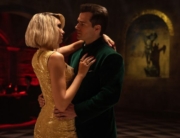Saeed Torres is no James Bond. A middle-aged man working as a school chef, he fits no stereotype of a spy. But in the fall of 2011, he revealed to David Sutcliffe and Lyric Cabral that he was a “civilian operative” working for the F.B.I. The filmmakers initially present him in a way that makes this doubtful; a lack of clear corroboration allows Torres to seem like a possible fabulist. When his story checks out, the new puzzling question is: How could he be responsible for any part of homeland security.
Since 9/11 and the accompanying “never again” credo, the F.B.I. has made it a mission to prevent terrorism before it happens. For assistance, the bureau has leaned on a network of informants to get close to, and then expose, suspects. A briefly featured news report offers this sound bite: “The best informants are kind of the worst people.” They build up relationships only to betray them.
Sometimes that behavior owes itself to leverage. Torres, a former member of the Black Panther Party, says he worked in the 1980s as a kind of Robin Hood figure and was arrested for robbing a New York City subway booth. He made a deal to give intelligence to the Feds, and that work became full-time after September 11th. “They didn’t train me for nothing,” he proudly declares, believing himself to be a natural in this employment.
But it’s a job which has alienated him from his community. Once active in a New York mosque, he now believes there is a fatwa against him for the part he played in the conviction of Tarik Shah. Shah was a friend, a jazz musician who gave Torres bass lessons. Now Shah is in prison. His sentence is an example for activists who believe the F.B.I.’s use of informants leads to entrapment.
Torres, joint in hand, makes his case to the directors about the difference between entrapment and his methods. Viewers have the opportunity to judge for themselves as Cabral and Sutcliffe film Torres posing as a man named Shariff and becoming friendly with a Pittsburgh man, Khalifah al-Akili, in the hopes of taking al-Akili down on a charge of terrorism.
At first, the guilt or innocence of al-Akili is murky as he and Torres play cat and mouse, but soon enough the targeted man smells something rotten, and in a brilliant twist, al-Akili makes contact with Cabral and Sutcliffe, who now present both sides of the ongoing investigation. It all makes for a gripping investigation, with sharp editing and a suspenseful score by Robert Miller. (The F.B.I. declined to be interviewed.)
(T)ERROR would be noteworthy if only as a portrait of an unlikely crimebuster. It ranks, however, with other strong documentaries on the war on terror by casting light on what might be a new wave of civil rights violations. This case might be overstated (Khalifah is incontrovertibly shown to be guilty of one crime), but it’s still one worth making and hearing.

















Leave A Comment